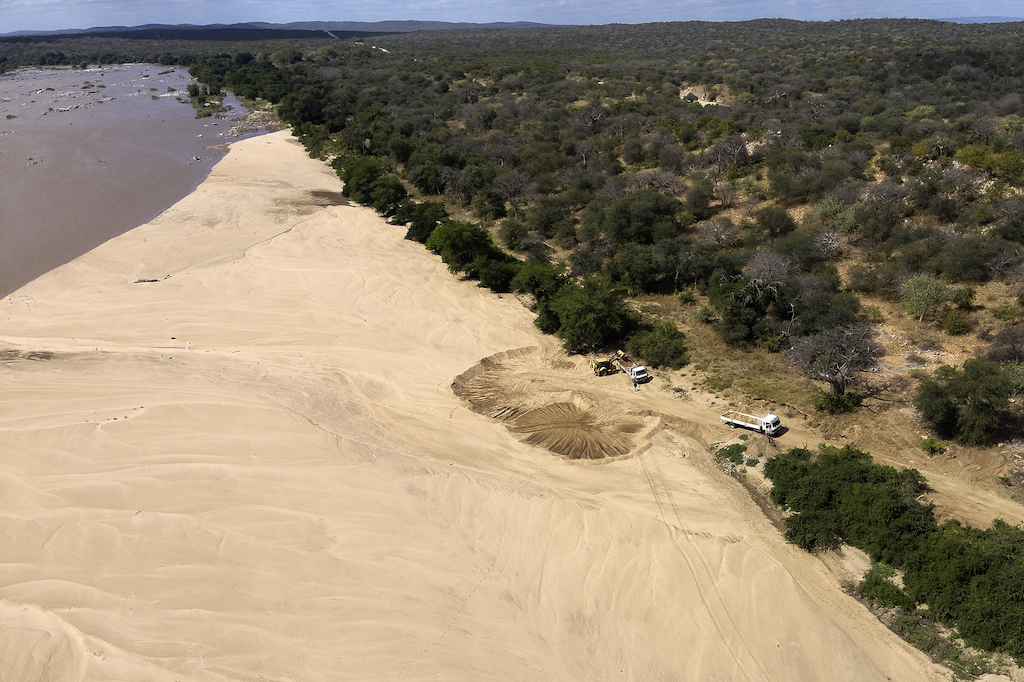
19 Sep Sand baroness’ unfettered mining highlights crisis on the banks of the Limpopo River
Judge slams authorities for not stopping illegal sand mining, but Limpopo businesswoman insists she has the right to mine. Chris Gilili investigates

Two trucks and an excavator waiting to load in the area where Maria Munyai is mining without environmental authorisation near the Limpopo River on May 14 2025. Photo: Supplied/Christo Reeders
Weeks after the Limpopo High Court ordered her to halt operations in one area, other companies linked to businesswoman and Musina municipal employee Maria Munyai continue to mine sand on a farm abutting the Limpopo River.
The farm’s manager, Jacque Turner, says the continued mining is illegal and the latest chapter in a years-long dispute with Munyai and her companies, which Turner has reported to the police scores of times and fought in court for years.
But, Munyai has said that she has a right to mine on the farm Vrouwensbrom. In a recent response, the Department of Mineral Resources and Energy (DMRE) said Munyai has in fact stopped mining on the permit and parcel of land that was subject to many of Turner’s complaints. The department said two other companies with separate permits continue to mine on the farm on the banks of the Limpopo River.
Those companies are registered to Munyai’s husband and daughter respectively, and Turner believes they are fronts for the same mining operation.
Just days after securing a judgment with costs against Munyai and DMRE on June 19 2025, Turner filmed in exasperation as trucks dumped sand which he said was illegally mined by Munyai.

Land owner
“The DMRE will deny everything. They are very reluctant and they are not abiding by the law. Before a permit is issued there must be a consultation with the land owner, there must be a public participation. They can’t rock up and say they have a permit, without that happening,” Turner said during an interview.
He accuses Munyai of using two more recently registered companies which now continue to mine on his land as a front. One is registered to her husband, the other to her daughter.
“She is basically cheating the system, because she knows the other company has broken many laws and there are many complaints about her company,” Turner said.
“Both of those new permits, we have put them under appeal.”
But, Munyai has in the past challenged Turner’s standing to report her – saying the sites she was mining did not belong to him. The court showed that Munyai’s original company continued mining despite the fact that its permit had lapsed in 2023. In the absence of enforcement from the police and DMRE, this fact however meant little for her business operations.
The court found that Munyai continued “with [her] mining activities unabatedly, whilst the authorities are sitting with their arms folded.”
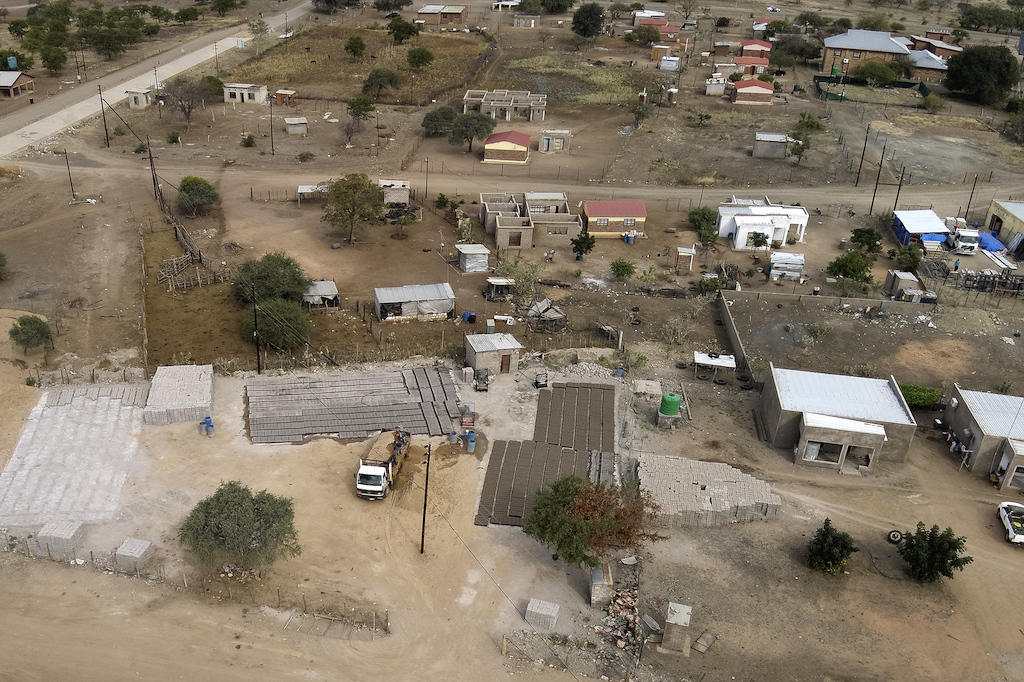
A truck filled with sand offloading at Maria Munyai’s brickyard in Malale Village on May 14 2025. Some of the RDP houses around the yard which Maria has supplied materials for are visible with red roofs. Photograph: Supplied
A broader dispute
The bitterness of Munyai and Turner’s battle is typical of longstanding tensions between the province’s farmers and environmentalists, on the one side, and sand-mining entrepreneurs on the other.
Farmer associations, environmental activists and political parties have for years sounded the alarm over what they characterise as flagrant, illegal and destructive sand-mining practices on the banks of the Limpopo River. But miners have heeded little, as they have learned to skirt legal and environmental regulations and exploit the police and government’s reluctance to act against them.
“The government must regulate and if they don’t it means that they are not fulfilling their duties. Sand mining has got a massive impact on the biosphere and on the environment,” said Jacobus Smalle, the Democratic Alliance’s provincial leader in Limpopo who has been vocal against the proliferation of illegal sand mining over the years.
He said the party has written to the national DMRE to look into the scourge of sand mining and said they will not get tired of fighting against it.
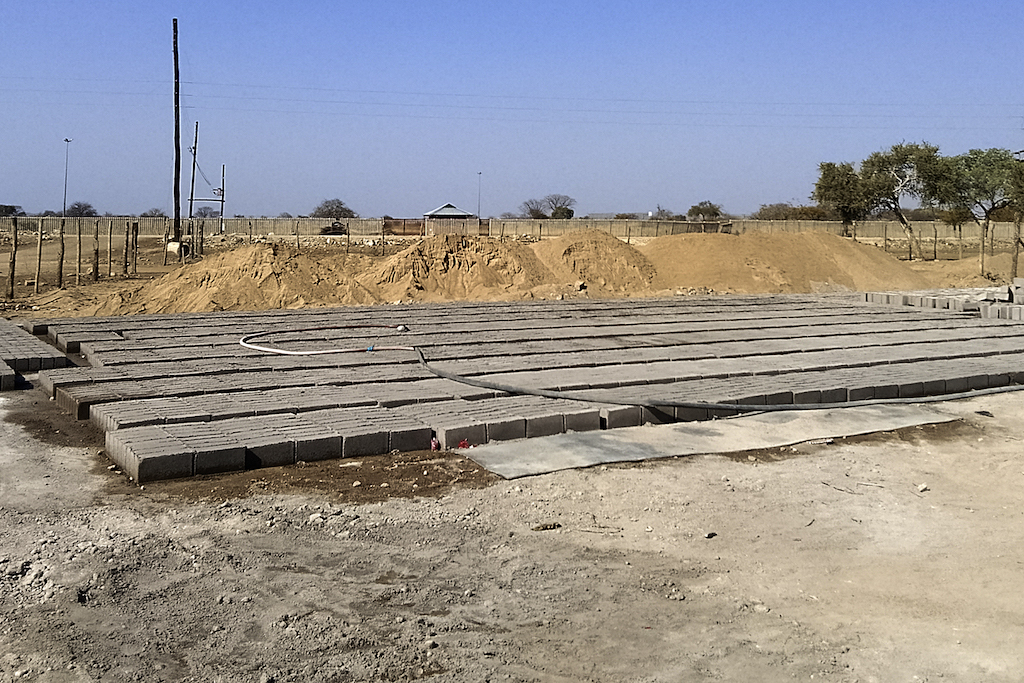
Newly made bricks dry in the sun inside Maria Munyai’s brick-making premises in Malale Village on August 1 2025. The site is also where Munyai stockpiles sand after excavating it from the Limpopo River. Maria said she employs about eight people who make the bricks for her. Photograph Chris Gilili/SA|AJP
Connections
Despite Munyai’s defiance, the court order issued in June was unequivocal: her permits had expired and her company had also mined outside demarcated areas. She was also found to be in contempt of an earlier court order from 2020, which had demanded that she enter into mediation with Turner and restrict her mining to legal operations only.
But, Munyai is no ordinary sand miner and seems to take such findings and orders in her stride. She has deep ties within the government. For 20 years she has worked as an administrator at Musina Local Municipality while building a parallel career in logistics, construction and sand mining.
In what may well present a conflict of interest, the Musina Local Municipality is, according to Munyai, also one of her businesses’ clients – buying her sand and bricks for construction projects.
When queried, the municipality responded that “activities by Mrs Munyai in supplying materials for RDP houses are not known to the municipality”.
Locals know her as a benefactor who buys clothes for poor children at Christmas time. But to her neighbours like Turner along the Limpopo River, she is a mining magnate who treats environmental regulations as optional.
Her company, TD Nhlamulo and His Mother Enterprises, initially held a mining permit, but that expired on March 17 2023, Munyai admitted under oath. Instead of closing down, Munyai appeared to expand operations, including under the guise of new companies registered to family members.
When challenged during an interview on August 1 2025, she claimed the “river is no man’s land”. She insisted she believed she had rights to the sand, despite the court order. She said that government letters gave her permission to mine. Yet, she did not produce these documents when requested by this reporter.
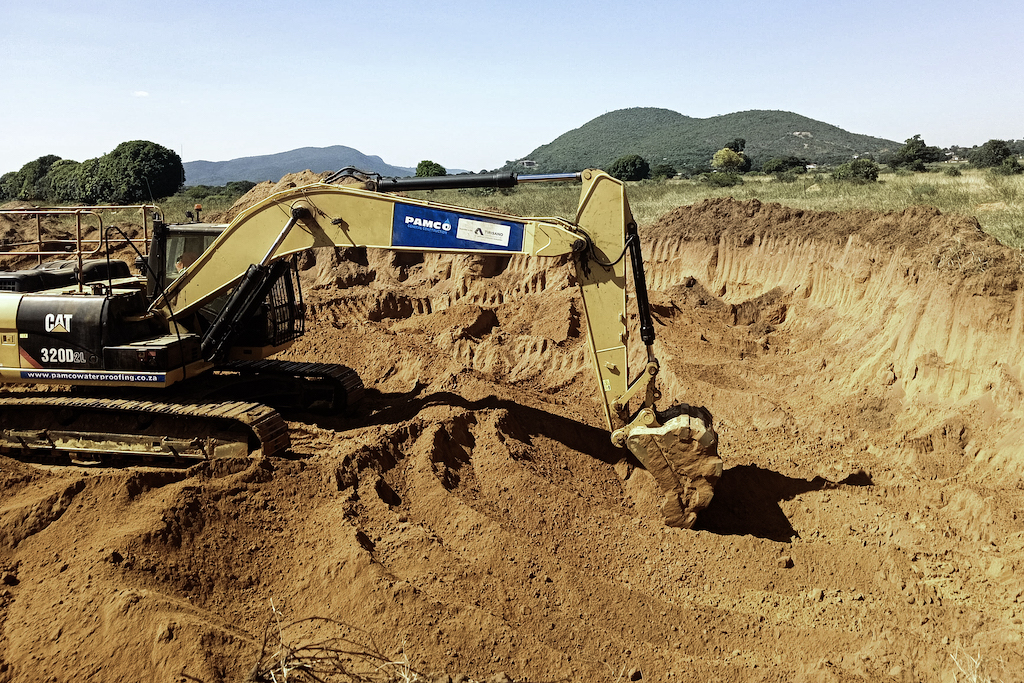
An excavator digs at an illegal sand mine in an area where people used to have farms in Tswera Village in rural Thohoyandou on August 6 2025. The sand mining has also destroyed all water infrastructure in the village. Photo: Chris Gilili/SA|AJP
Farmers pushed to the brink
For Turner, who manages Tshipise Safaris on land adjoining the river, the fight has been exhausting. He has spent millions on legal fees trying to stop Munyai from mining his farm, he said. At one point, Turner even installed concrete bollards to mark the legal boundary. Munyai’s workers allegedly tore them down and continued to dig.
“Everything that Maria [Munyai] is doing on my farm is illegal. The court has said it. Yet she continues, and the authorities allow her,” Turner said.
Other farmers tell similar stories. Rhudzani Netswera, a pensioner near Thohoyandou, saw his three-hectare farm stripped bare by illegal sand miners in 2023. He spent his savings on lawyers, but lost everything.
“They left irreparable damage to my land,” he said.
These cases highlight how small-scale farmers, often with limited resources, are left to fend off industrial-scale operators with excavators and trucks — sometimes under threat of violence.
The court found that more than 130 criminal complaints filed against Munyai at Tshamutumbu police station went nowhere. Officers told complainants to take their cases back to the DMRE. But the DMRE in turn referred them back to the police.
Judge Du Plessis wrote that it was “evident that neither the DMRE nor the SAPS fulfilled their legislative obligations.”
The court reviewed and set aside any mining permit that might still be claimed as valid or renewed. The court also ordered costs against Munyai and the state.
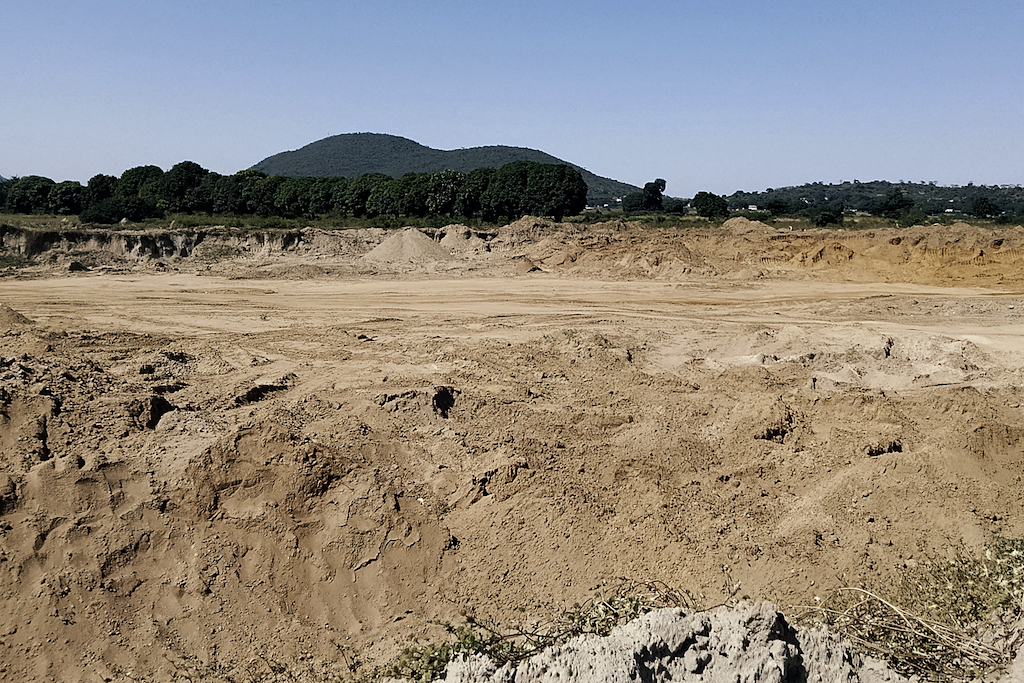
A partly abandoned illegal sand mine in Tshiombo Village in rural Thohoyandou, Limpopo, on August 6 2025. After mining the area, the miners leave large open sand pits like this one which pose a danger to communities and livestock. Photograph Chris Gilili/SA|AJP
A wider Limpopo crisis
Munyai’s case is not unique. Across Limpopo, the sand trade is booming — and it remains largely unregulated.
“Unregulated sand mining destroys riverbank vegetation, destabilises banks, erodes soil, and causes biodiversity loss,” said Lauren Liebenberg, chair of the Vhembe Catchment Management Forum.
“This leads to a collapse in ecosystem service provision on which poor rural communities especially depend.”
During an interview, Agri SA’s Janse Rabie noted that permits are meant for small, two-year operations covering no more than five hectares. He explained that unscrupulous miners regularly apply for and are granted multiple mining permits adjacent to one another, as Munyai is accused of doing with two companies registered to family members.
“Although this is not supposed to be allowed, it seems to be a standard way of clothing such applications with a semblance of legitimacy,” Rabie said.
The result is that once pristine estuaries are gouged into craters, with water for farming and households fast disappearing, communities reliant on these rivers are left impoverished.
The Aggregate and Sand Producers Association of South Africa (ASPASA) estimates that the DMRE is aware of barely half of the country’s illegal sand mines. Despite repeated reports from corporations and NGOs, most illegal operations carry on.
Sand is South Africa’s most extracted mineral — more than coal or platinum — but unlike those, it is governed by weak permitting regimes. As demand for housing, cement and infrastructure grows, so does the incentive to mine it illegally.
The Limpopo River, which straddles an international border, has become a frontline. What happens there affects ecosystems and communities in both South Africa and Zimbabwe.
For Liebenberg, the stakes are existential: “This is ecological violence, driven by greed and reckless indifference. If the state does not act, the river will not survive.”
The story of Munyai is not just about one businesswoman who defied the courts. It is about a system in which laws are flouted, regulators are complicit, and rivers are sacrificed to profit.
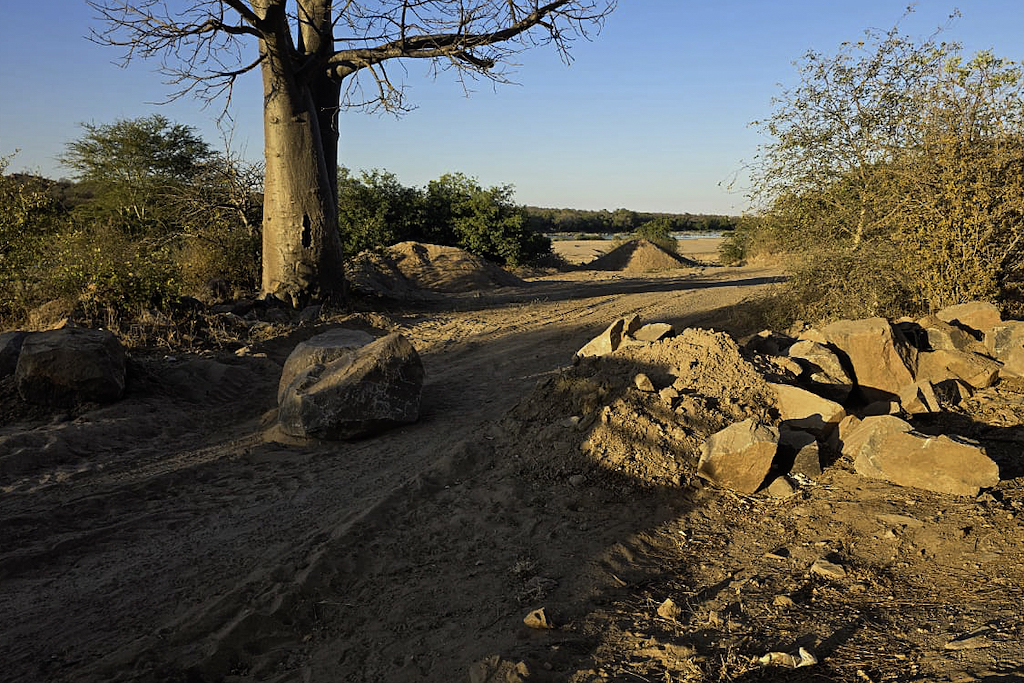
A rock is placed in the road to block anyone else from loading sand where Maria Munyai mines near the Limpopo River on May 14 2025. Photograph: Supplied
Right of reply
Despite being called out by Judge Du Plessis for manifold failures of enforcement in the Munyai case, neither the police nor DMRE responded substantively to queries.
The SAPS in their response defended Major General Eddie van Der Walt, commissioner of the Vhembe District who was specifically called out in the judgment.
“It must be stated categorically that the district commissioner is not involved in the administration of mining licences since that is the competency of the Department of Mineral Resources and Energy. The SAPS and DMRE are working closely to ensure that illicit mining activities are prohibited from taking place,” SAPS spokesperson Brigadier Shulani Mashaba said.
The DMRE’s spokesperson, Johannes Mokobane, rightfully explained that anyone who intends to do sand mining should apply for a mining permit through his department.
“A mining permit is valid for the period specified on the permit but may not exceed two years. It may be renewed for three more periods of no more than a year each. A mining permit may only be issued if the mineral in question can be mined optimally for two years and the mining area does not exceed 5 hectares in size,” said Mokobane.
In a follow-up query about what the department has done in light of the June judgment against it, and Munyai’s continued operations, the department said it was not aware of Munyai mining sand from the site where her permit has lapsed.
“The department is not aware of mining on the lapsed permit. It must be noted that the department has recently issued two mining permits adjacent to the lapsed permit of TD Nhlamulo and His Mother and Business Enterprise to Mendes Vanessa Trading Enterprise (Pty) Ltd and Rotewa Holdings Trading and Enterprise (Pty) Ltd, and those permits are still valid,” the response said.
Munyai did not respond to follow-up queries about her continued operations in spite of the court order against her. She did not answer or respond to several calls and messages.
This report has been produced by the Southern Africa Accountability Journalism Project (SA | AJP), an initiative of the Henry Nxumalo Foundation with the financial assistance of the European Union. It can under no circumstances be regarded as reflecting the position of the European Union.
